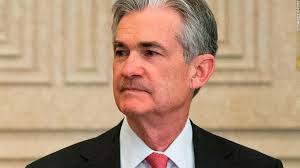 Federal Reserve Chairman Jerome Powell announced on Wednesday that he expects the U.S. economy to continue its growth trajectory, despite risks from overseas and concerns about trade tensions between the U.S. and its prime trading partners, including China and the European Union. Powell has noted that by cutting interest rates which reduced borrowing costs on mortgages and other loans have had a direct impact on the strengthening of the U.S. economy. In his note, Powell also called upon Congress to lower the federal budget deficit so that lawmakers would be able to increase spending in the future to stave off a recession.
Federal Reserve Chairman Jerome Powell announced on Wednesday that he expects the U.S. economy to continue its growth trajectory, despite risks from overseas and concerns about trade tensions between the U.S. and its prime trading partners, including China and the European Union. Powell has noted that by cutting interest rates which reduced borrowing costs on mortgages and other loans have had a direct impact on the strengthening of the U.S. economy. In his note, Powell also called upon Congress to lower the federal budget deficit so that lawmakers would be able to increase spending in the future to stave off a recession.
U.S. President Donald Trump begs to differ. As recently as Tuesday, President Trump attacked the Fed for not slashing interest rates enough and gave himself credit for the “economic boom” that the U.S. is currently experiencing.
Despite strong concerns about the state of the U.S. economy, recent data indicates that growth is continuing in the region. The U.S. economy expanded at an annual rate of 1.9 percent in Q3 2019, and unemployment remains near 50-year lows.
Still, Trump’s detractors argue that like most politicians, Trump has colored the U.S. economic situation as he wants it to be seen, which may not be as it really is. Sure, he’s lauded the U.S. manufacturing sector for adding jobs, but the truth is, its numbers are lower than they were before the 2008 financial crisis. Likewise, manufacturing has slowed for the past three months, and the stimulus from Trump’s highly publicized tax cuts is beginning to evaporate, contributing to projections of slowing economic growth in the U.S. Trump, in typical fashion, has blamed all of the economic declines on the Fed.
In the meanwhile, U.S. stock indexes continue to hit new highs. The S&P 500 closed up 0.0-7 percent on Wednesday, while the Dow Jones Industrial Average ended the day 0.33 percent higher. The NASDAQ closed down 0.05 percent. Asian markets were also mixed on Thursday afternoon in Asia. China’s benchmark indexes, the Shanghai Composite and the Shenzhen Composite were up 0.37 percent and 0.80 percent respectively as of 2:01p.m. HK/SIN. South Korea’s Kospi and Australia’s ASX 200 were also trading higher, while Japan’s Nikkei 225 was down 0.61 percent. Hong Kong’s Hang Seng Index was trading 0.65 percent lower. Pressure on the markets continues to come from the U.S.-Sino trade war whose resolution remains elusive, as well as data from the region that shows signs of an economic slowdown. On Wednesday, U.S. news outlets reported that the trade talks are stalled due to disputes about farm issues. Continued rioting in Hong Kong also contributed to the declines.
